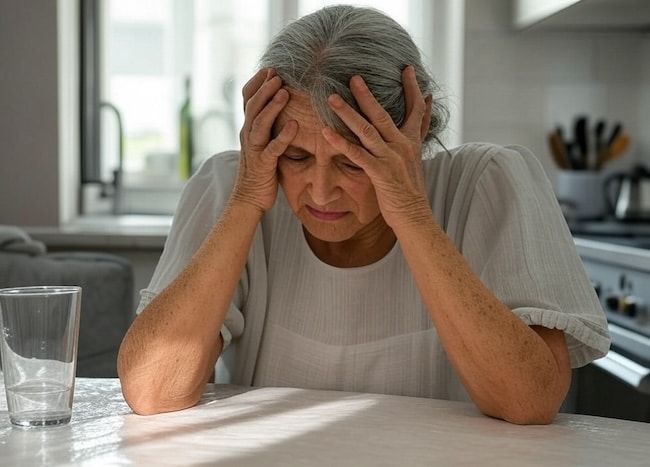A common and often heartbreaking question for caregivers is whether a loved one with Alzheimer's disease is aware of their own condition. The answer is complex and rooted in the brain changes caused by the disease itself.
Many individuals with Alzheimer's may genuinely not know or believe they are ill, a neurological phenomenon known as anosognosia. This lack of awareness is different from simple denial and can lead to frustration, confusion, and conflict within families.

This article explores the crucial distinction between denial and anosognosia, helping caregivers understand why their loved one might insist they are “just fine” and offering compassionate strategies for navigating this challenging aspect of the disease.
Do people with Alzheimer’s Know They Have It?
Many family caregivers want to know – “Do people with Alzheimer’s know they have it?”
You might be surprised to learn that some people are not aware that they have Alzheimer’s.
People with Alzheimer’s, dementia, brain tumors, stroke, and other types of damage in the brain are cognitively impaired and, because of that, might not believe anything is wrong with them.
Sometimes, this is caused by anosognosia (pronounced ah-no-sog-NOH-zee-uh, hear it here).
The meaning of anosognosia is “to not know a disease,” and it isn’t the same as being in denial.
Anosognosia Occurs When Someone Isn't Aware of Their Condition
Anosognosia is a lack of awareness of one's health condition. It’s common in some cognitive conditions, including Alzheimer’s.
So, if someone is diagnosed with Alzheimer’s and also has anosognosia, they won’t know or believe that they have it.
Each person is unique, so the symptoms of anosognosia might vary. Symptoms may change over time and vary throughout the day.
For example, a person might sometimes understand what’s going on and other times believe that they’re fine.
Because of this inconsistent behavior, some family members and friends may not realize anything is wrong, even if they notice unusual behavior.
Anosognosia and Denial Aren't the Same Thing
When someone is in denial, they’re aware of a fact, but refuse to accept it.
But with anosognosia, someone with Alzheimer’s isn’t in denial. They’re not even aware that they’re cognitively impaired.
The disease has damaged their brain and makes it impossible for them to be aware of what’s happening.
Symptoms of Anosognosia
Being unaware of cognitive impairment can affect one’s understanding of memory, overall thinking skills, emotions, or physical abilities.
For example, they might have trouble with language, such as an inability to find words for everyday objects or simple tasks.
However, they might try to explain these situations by saying they forgot or are tired.
Or, if they miss an appointment, forget to change dirty clothes, or leave food unrefrigerated, they’ll probably still make excuses and insist that there’s nothing wrong.
And even if it’s evident to others that they need help, they’ll likely insist that they’re just fine and able to care for themselves.
They might even get angry or defensive if you remind them about their cognitive impairment because they’re convinced that there’s no problem.
Final Thoughts on Anosognosia in Dementia
Understanding anosognosia (the lack of awareness of one's own illness) is a vital step toward compassionate caregiving for a loved one with Alzheimer's. Recognizing that their insistence that “nothing is wrong” is a symptom of the disease, not stubbornness or denial, can help reduce family conflict and emotional distress.
This knowledge empowers caregivers to adjust their communication, avoid futile arguments, and focus on providing supportive, empathetic care. While the journey is undeniably complex, grasping this concept can foster greater patience and a deeper connection, allowing you to meet your loved one where they are with kindness and understanding, even when they cannot perceive the reality of their condition.
Recommended for you:
- 15 Insightful Dementia Communication Tips
- 3 Stages of Dementia: What to Expect as the Disease Progresses
- Therapeutic Fibbing: Why Experts Recommend Lying to Someone With Dementia
About the Author

Connie is the founder of DailyCaring.com and was a hands-on caregiver for her grandmother for 20 years. (Grandma made it to 101 years old!) She knows how challenging, overwhelming, and all-consuming caring for an older adult can be. She also understands the importance of support, especially in the form of practical solutions, valuable resources, and self-care tips.













